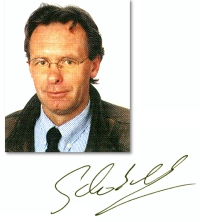Cytomed’S ISCT Therapy can be used with all illnesses, including heavy and chronic illnesses, and as an accompanying base therapy together with other standard forms of treatment Applications of Cytomed’s ISCT Therapy include:
- Anti-Aging-Therapy, in individual therapies with measurable cell-rejuvenation.
- Regeneration therapy for all chronic illnesses, for general lack of vitality and weakness, and for the increasing of physical, mental and sexual capacity.
- Heart and blood circulation illnesses, arteriosclerosis, heart attack and stroke, cholesterol regulation – including the early diagnoses of these illnesses several years prior to the appearance of their symptoms.
- Therapy for all forms of weakened immune system resistance, such as with allergies, rheumatic illnesses, environment- and age-related illnesses.
- Diabetes, skin diseases and premature skin aging.
- Age-related illnesses such as female menopause and male prostate problems, including conditions like mental fatigue and memory problems.
Elements of Cytomed’S ISCT therapy
The total is more than the sum of its parts – this also appears to be the case with Cytomed’s ISCT Therapy. Exceptional treatment successes are based on the use of targeted combinations of specific therapies, tailored to the specific needs of each patient. Long and extensive research and medical experience over decades has resulted in a system of analysis, diagnosis and personalised patient treatment. Cytomed’s ISCT Therapy is based on a system of analysis, diagnosis and therapy based on combinations of treatment required in each individual case, and how these are selected.
In Cytomed’s ISCT Therapy, immune system therapy is of particular importance because vitality, mental, physical and sexual capability and the aging process are all dependent on an intact, properly functioning immune system. Accurate knowledge of the immune system’s status is also crucial for the treatment of cancer, arteriosclerosis, diabetes, rheumatism and many other illnesses. In context of anti-aging therapy, the condition of the immune system is the starting point for the development of successful strategies against the aging process, because a lasting reduction of aging can be achieved by means of the targeted control of lymphocytes especially commencing from the 35th to 40th years of age.
Important elements of the " Cytomed Immune sytem- and cancer-therapy " include:
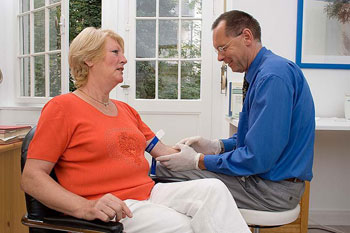
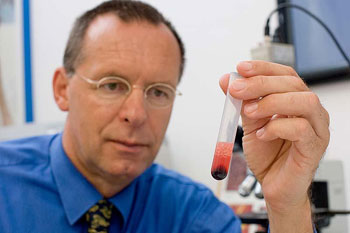
1. Phylum cell therapy, in form of the Cytomed’s ISCT Therapy, activates the immune system through utilising the body’s -own substances. The first exceptional feature of this new by Cytomed-developed methodology is that only the patient’s cleaned blood-serum and blood immune cells are used for the therapy, rather than using the patient’s whole blood. This form of own-blood therapy can not and does not infuse the patient with any bacteria, viruses, disease causing protein residues or any other pathogens contained in his own blood.
Phylum cells, the primary blood cells, are often damaged or destroyed in present day cancer therapies leading to the need for very costly transplants from the patient’s own bone marrow. After radiation - or chemotherapy – during which the phylum-cells are often badly damaged, earlier scavenged phylum cells could rather be re-supplied to the patient’s blood supply.
Cytomed has developed a simpler and more affordable method of filtering out existing phylum TB phylum cells from the blood and to later re-administer them as activated immune system reactivation agents.
Together with Cytomed’s ISCT treatment, there are various different additional remedies which can be added to the patient’s treated own-blood. This is administered by injection and includes immune stimunlants, vitamins, enzymes, plant remedies and others, through which a high effectiveness of the immune system cell therapy can be achieved. The individual selection of these methods is on the basis of Cytomed’s blood analyses and subsequent diagnosis, and is the second exceptional feature of this blood phylum cell immune system cell therapy.
The effectiveness of the injections can be increased by the selection of certain acupuncture points, in which the patient’s own treated blood is injected. This is the third exceptional feature of the Cytomed own-blood treatment therapy.
2. Dendritic cells represent an important function in the immune-system. Among the antigen presenting cells, they are the ones most capable of stimulating defensive reactions so that specialised T-Lymphocytes cells, that destroy tumor cells, are produced in large numbers. Immune therapy with dendritic cells is a very promising new therapy opportunity, that can also applied after a surgical tumor resection. It is also complementary to chemotherapy, or can be used by itself. It is based on the realization that the human body’s own defenses can be directly targeted at cancer cells. These T-cells cells are “loaded” with tumor-antigens, or alternatively also with synthetically produced peptides or antibodies. Out-patients can receive injections of the entire dendritic cell-complex so that the immune-system is stimulated and retargeted to destroy tumors.
3. Immune-modulators are different specific substances - based on plant, microbial and animal extracts - that can influence processes in the immune system in different ways. This immune-modulation includes immune stimulants, immune supressors, immune prophylaxis (including vaccination) and immune substitution as well as non-specific measures for the strengthening - or the weakening - of the defensive capacities of the organism. Immune stimulants - which lift the activity of the weakened immune-system - include for example: zytocina (interferons, interleucines), growth-factors (CSF, EGF, PDGF, IGF), Sera (and Aojuvans), thymus-factor respectively Thymopoletin, extracts from plants (for example Echinea angustifolia or purpurea), extracts from micro-organisms (for example BCG) and from organs, plant single-materials as well as synthetic substances (for example Levamisol, Diacetylsplenopentin, Dimepranol and Inosin).
4. Interferons, which are specific proteins formed as immune system responses to viral infections and to certain other stimuli. They belong to the group of the zytocines. For example, the so-called interferon-y-inducing factors increase the activity of the natural killer-cells of the immune system. The activated T-cells petides (with MG 15 400 D) on the other hand serve as T-cell growth-factor (so-called T-cell growth factor TCGF), stimulating the production of other zytokines (for example including different interferons); which increases the proliferation of B-cells, inducing the cytotoxicity of activated macrophages (the effectiveness of scavenger cell immuno-defense) and is applied as an immune system modulator, mainly in cases of malignant melanoma and advanced carcinoma.
5. Interleucines are substances belonging to the zytocina, which work as the communication medium of the immune system. As mediator substances they are responsible for the induction and course of the T-cell transferred cytotoxic immune-reaction as well as for B-cell activation.

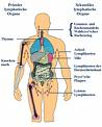
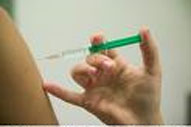
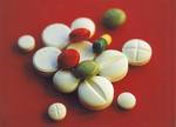
6. NK cells, which are the body’s natural killer cells, are big granulated lymphocytes that are cytotoxic without requiring pre-sensitization and without the participation of antigens of the HLA-System.
7. Mono-clonal antibodies are bred from the immune system’s B-cells. Different types show quite specific structures, through which specific key-like reactions in the immune-system can be caused in each instance. With their assistance the immune system’s reaction can therefore be selectively influenced.
8. Enzyme therapy inserts specifically targeted enzymes as catalysts for chemical reactions in the metabolism. Many metabolic disturbances are associated with enzyme deficiencies or disturbances, which can be diagnosed by the analysis of enzyme breakdown in the blood. Elimination of these metabolism disturbances has a positive effect on the immune system, in cancer-therapy and on the aging process.
9. Hormone therapy Is a targeted therapy which makes a lot of sense when addressing many age-related ailments, in order to increase physical, mental and sexual capacity. It is also a vital aspect of anti-aging therapy. Individual hormonal therapy requirements must however be assessed by personalised analysis.
10. Orthomoleculare medicine is a therapy incorporating the targeted use of vitamins, minerals and trace elements. It is crucial in the treatment of all chronic illnesses, especially if these are interconnected with exhaustion and tiredness. It is also necessary in instances of immune system problems, arteriosclerosis, neurodermitis, osteoporosis, cancer, disturbances of the metabolism, regeneration after heavy illness, deficiency-related illnesses, loss of hair and for anti-aging therapy. Individual needs are determined on the basis of the cell-energy-profile, through which deficits in the citric acid cycle of the cell - the key to the production of ATP thus the energy of the cell - can be assessed.
11. Mistletoe-therapy is a recognized form of plant-medicine and immune-therapy. In the laboratory, the suppression and even destruction effect of mistletoe on cancer-cells has been demonstrated. The numbers and activity of the body’s natural defence system killer cells should increase as a result of the application of mistletoe extracts (Viscum album) and it should also slow down the rate of growth of tumors. Furthermore, it should promote the release of interleucine-1, through which the body generates increased pain-relieving hormones (endorphines).
12. Additionally favored forms of therapy in Cytomed’s ISCT therapy include: Oxygen-therapy after professor Ardenne, irradiation after Eichother, Chelatotherapy, amino acids and Gluthation therapy, organ extract therapy, thermo-irradiation and infrared therapy.
HIV-Infection
It is well known that HIV infection is treated with ACT. The success is minor and doubtful despite the extreme expenses for medicine. Only a selective combination of different therapy forms enables a success. Recommendable is a combination of immune system stimulation, immune system modulation, active T-cell regulation, mycosis therapy, regeneration and virustatica.


